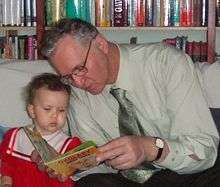Jerzy Bartmiński
Jerzy Bartmiński (born 19 September 1939) is a Polish linguist and ethnologist.
Jerzy Bartmiński | |
|---|---|
 Bartmiński with one of his 15 grandchildren, Warsaw, Poland 2006 | |
| Born | 19 September 1939 |
Biography
Jerzy Bartmiński was born in Przemyśl to a Polish family of Galicia craftsmen, moved to Lublin in 1956. He studied Polish philology, and in 1971, he earned his PhD, focusing his research on the language of folklore.[1]
As a young scholar at UMCS Lublin University together with his wife and children he established one of the first groups of home church Catholic Renewal movement in Poland.[2] In the 1980s, he took part in anti-communist activities as a member of Solidarity and was a University leader of this movement in Lublin. He was repressed after declaration of the Martial law in Poland in 1981.[3] Later, Bartmiński was one of the founders of "Solidarity of Families" movement and foundation, focusing on reactivation of social bonds in post-communist society, support for poor families, and educational support for children.[4]
Professional life
Bartmiński is member of Polish Academy of Arts and Sciences,[5] and is a professor of Polish philology at the Maria Curie-Skłodowska University in Lublin, Poland.[6] Since 1976 he has been leading the research team that has been reorganized as the Department of Textology And Grammar of Contemporary Polish Language.[7] For several years Bartmiński has been the chairman of jury of folklore songs festival in Kazimierz Dolny, one of the biggest events of this kind in Central Europe. Bartmiński is a member of the Polish Language Council.[8]
He has authored over 300 publications and books. One of his recent books (2007), Linguistic bases of the perception of the world (Jezykowe podstawy obrazu swiata), is considered to be among the most significant Polish publications in the disciplines of the humanities.[9]
His research interests focus on textology, linguistic axiology, and ethnolinguistics.
Footnotes
- "Prof. dr hab. Jerzy Bartminski". Uniwersytet Marii Curie-Sklodowskiej w Lublinie. Archived from the original on 2007-10-12. Retrieved 2008-05-26.
- "History of the Home Church movement in Poland". Archived from the original on 2008-04-16. Retrieved 2008-05-26.
- "Jerzy Bartminski". Encyklopedia Solidarnosci. Retrieved 2008-05-26.
- Deptula, Ewa (2006). "Solidarność Rodzin". Warto było. Lublin, Poland: Agencja Wydawnicza Werset. p. 249. 83-60133-28-X.
- "Archived copy". Archived from the original on 2014-10-14. Retrieved 2014-11-15.CS1 maint: archived copy as title (link)
- "Prof.dr hab.Jerzy Bartminski". Nauka Polska. Archived from the original on 2011-07-17. Retrieved 2008-05-26.
- "Zaklad Tekstologii i Gramatyki Wspolczesnego Jezyka Polskiego". Uniwersytet Marii Curie-Sklodowskiej w Lublinie. Archived from the original on 2011-06-12. Retrieved 2008-05-26.
- "Informacje o Radzie". Rada Jezyka Polskiego. Retrieved 2008-05-26.
- "Linguistic bases of the perception of the world; Jerzy Bartminski". www.ksiazki.tv. Retrieved 2008-05-26.